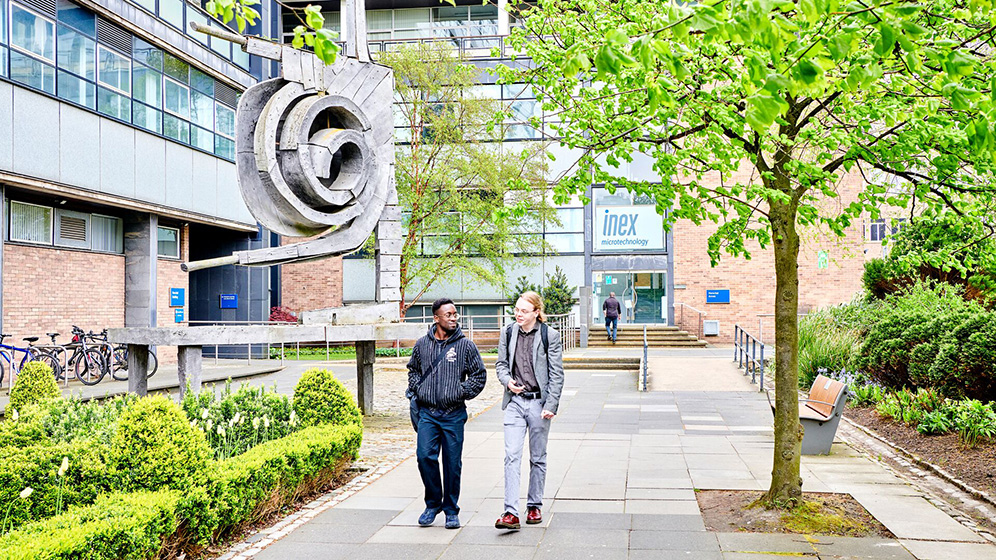Data Science BSc Honours
- UCAS code: G200
- Full time
- 3 years
Combine your passion for mathematics and computer science with this practical Data Science BSc degree. This degree is delivered in partnership with the UK’s National Innovation Centre for Data (NICD).
You are currently viewing course information for entry year: 2026
Next start date:
- September 2026
UCAS Institution name and code:
- NEWC / N21
Course overview
Data science is an interdisciplinary and emerging field. It combines mathematics and computing to analyse large and complex data sets.
Our degree will give you the skills to turn data into meaningful outcomes. You'll learn to use your analytical and computational skills to interpret, clean, and visualise data confidently.
We've worked with the National Innovation Centre for Data (NICD) to create our Data Science BSc degree. This Centre of Excellence is at the forefront of:
- data science
- AI application
- industry engagement
NICD has shaped our curriculum with their real-world and industry-focused approach. You'll graduate with expertise in the most relevant and innovative data science topics. You'll learn and work alongside leading practitioners in data science.
Through NICD, you'll have extensive access to real-world data, immersing yourself in real-world data science applications. NICD works with external organisations to transform their business using data science methods, tools and techniques.
You'll develop bespoke data science skills and build a strong foundation in mathematics and computer science, through:
- specialised modules
- masterclasses
- bootcamps
You'll have the option to take a paid industry placement or study abroad year.
By the end of your degree, you'll be ready for a career in this emerging and rewarding job sector.
READ MORE
Sorry, you need JavaScript to view this video
Your course and study experience - disclaimers and terms and conditions
Please rest assured we make all reasonable efforts to provide you with the programmes, services and facilities described. However, it may be necessary to make changes due to significant disruption, for example in response to Covid-19.
View our Academic experience page, which gives information about your Newcastle University study experience for the academic year 2025-26.
See our terms and conditions and student complaints information, which gives details of circumstances that may lead to changes to programmes, modules or University services.
Quality and ranking
Professional accreditation and recognition
All professional accreditations are reviewed regularly by their professional body.
Modules and learning
Modules
The information below is intended to provide an example of what you will study.
Most degrees are divided into stages. Each stage lasts for one academic year, and you'll complete modules totalling 120 credits by the end of each stage.
Our teaching is informed by research. Course content may change periodically to reflect developments in the discipline, the requirements of external bodies and partners, and student feedback.
Optional module availability
Student demand for optional modules may affect availability.
Full details of the modules on offer will be published through the Programme Regulations and Specifications ahead of each academic year. This usually happens in May.
To find out more please see our terms and conditions
Our Foundations of Data Science module will introduce you to the world of data science. You'll study foundational topics in mathematics and computing. In Stages 2 and 3, you'll build on these subjects with more bespoke data science modules.
Mathematics topics include probability, statistics, algebra and calculus. In computing, you'll learn about the software engineering lifecycle and develop your programming skills.
Modules
| Compulsory Modules | Credits |
|---|---|
| Foundations of Data Science | 20 |
| Programming Portfolio 1 | 30 |
| Real Analysis | 10 |
| Introductory Calculus | 10 |
| Introduction to Probability and Statistics | 20 |
| Number Systems | 10 |
| Introductory Algebra | 10 |
| Multivariable Calculus | 10 |
You'll study specialised modules in mathematics and computer science, including:
- data visualisation
- regression
- security programming
- algorithm design and analysis
You'll also study a module delivered by NICD. You'll work as a team on real-world business challenges. You'll learn to solve problems and develop customer-oriented solutions.
Modules
| Compulsory Modules | Credits |
|---|---|
| Security Programming | 20 |
| Algorithm Design and Analysis | 10 |
| Frontiers in Data Science A | 10 |
| Linear Algebra | 10 |
| Statistical Inference | 10 |
| Stochastic Processes | 10 |
| Data Visualisation | 10 |
| Probability | 10 |
| Regression | 10 |
| Optional Modules | Credits |
|---|---|
| Groups and Rings | 10 |
| Curves and Surfaces | 10 |
| Coding Theory | 10 |
| Numerical Methods with Python | 10 |
| Mathematical Biology | 10 |
In Stage 3, you'll continue to take part in masterclasses run by NICD. You'll apply statistical, mathematical, programming and data science skills to a variety of problems. You’ll also be free to explore your own interests with a range of optional mathematics and computer science modules.
Put your learning into practice during your Group Project module. During this project, you'll:
- work with real-world data sets
- identify and unpick problems
- work in a team to solve business challenges
Modules
| Compulsory Modules | Credits |
|---|---|
| Computer Vision & AI | 20 |
| Foundations of Machine Learning | 10 |
| Statistical Modelling | 10 |
You also undertake the following compulsory modules:
| Compulsory modules | Credits |
|---|---|
| Data Innovation Bootcamp | 10 |
| Frontiers in Data Science B | 10 |
| Data Science Group Project | 10 |
We base these figures and graphs on the most up-to-date information available to us. They are based on the modules chosen by our students in 2024-25.
Teaching time is made up of:
- scheduled learning and teaching activities. These are timetabled activities with a member of staff present.
- structured guided learning. These are activities developed by staff to support engagement with module learning. Students or groups of students undertake these activities without direct staff participation or supervision
Teaching and assessment
Teaching methods
You’ll learn through a combination of different methods including:
- lectures
- small group seminars
- hands-on labs and practicals
Modules taught by NICD will take an experiential learning approach. This means you'll learn by doing. You'll use ideation and the innovation process to solve real-world problems. Approaches include:
- flipped learning
- bootcamps
- masterclasses
During flipped learning, you’ll research a topic and report back to subject experts.
Throughout the course, you'll develop an open-source portfolio. You'll use it to track and showcase your skills and expertise to future employers.
Assessment methods
You'll be assessed through a combination of:
-
Coursework
-
Examinations – practical or online
-
Group work
-
Portfolio submission
-
Presentations
-
Projects
-
Seminar tasks/exercises
Skills and experience
Practical skills
The field of data science presents new and unique problems. We’ll teach you how to use your knowledge and skills to tackle these challenges and find solutions.
This degree will give you the skills employers, across the globe, are looking for.
You'll take part in bootcamps and masterclasses at NICD, developing your research and presentation skills. You'll work alongside technical experts and industry professionals.
You'll also develop experimental, analytical, and research skills through computational and project-based modules.
You’ll have access to our state-of-the-art facilities, including:
- our computing labs in the Urban Sciences Building
- the Catalyst at Newcastle Helix
The Catalyst hosts a dynamic community of businesses and research specialists. It's also the home of NICD.
Business skills
This hands-on degree will give you the skills to start a career in data science after graduation.
NICD will lead part of your teaching in Stages 2 and 3. You’ll work alongside businesses, using their data to solve real problems. This will help you learn the language of business. This is a great opportunity to improve your portfolio and CV with examples of industry collaborations.
In Stage 3, you'll take part in an industry-focused group project. You'll develop your teamwork and practical skills, preparing you for the world of work. You’ll explore the ethics of data and the modern application of data science in the real world. The group project will help you develop communication skills and confidence in explaining technical concepts to non-experts.
Research skills
Your teaching will be research-led, informed by the latest research findings from the:
- School of Mathematics, Statistics and Physics
- School of Computing
- National Innovation Centre for Data (NICD)
The course is delivered in collaboration with NICD. You'll have access to a Centre of Excellence at the forefront of data science, AI and industrial engagement. Your learning will be informed by real-world applications of data science.
You'll develop research skills during the Group Project in Stage 3. As part of this module, you'll need to:
- survey the current landscape
- assess problems and find coherent solutions
- explain your research
Opportunities
Study abroad
Experience life in another country by choosing to study abroad as part of your degree. You’ll be encouraged to embrace fun and challenging experiences, make connections with new communities and graduate as a globally aware professional, ready for your future.
You can choose to spend up to a year studying at a partner institution overseas.
If you choose to study abroad, it will extend your degree by a year.
Find out more about study abroad
Work placement
Apply your practical skills, increase your confidence and gain real-life work experience to accelerate your career. Take a 9-12-month industrial placement in the UK or abroad. Work placements usually take place in stage 3 of your studies and extend your degree by one year.
Facilities and environment
Facilities
You'll join the School of Mathematics, Statistics and Physics based in the Herschel Building.
A state-of-the-art learning environment will support your studies and you'll have access to extensive IT facilities for teaching and self-study, including:
- computer-based exercises with instant review of model solutions
- problem-solving video tutorials
- recording system for video capture of lectures, which you can download and watch again to help with your revision
The Herschel Building also has dedicated study and social spaces, and a computing area.
Support
We take your health and wellbeing seriously and are committed to supporting you throughout your studies so you can fulfil your potential at university. This support includes:
- a personal tutor who is an academic member of staff who can help you with academic and personal issues throughout your degree
- a peer mentor scheme which pairs you with a current student from your course to help you navigate your first year at university
- a student-staff committee, to give you an opportunity to have a say in how your degree works
- Student Wellbeing Advisors who can offer comprehensive listening and support and signpost you to other University support services or external support agencies
Transition Officer
A dedicated staff member is here to support you in transitioning from school to university study.
The Transition Officer works with Stage 1 undergraduates to provide:
- Stage 1 pastoral and academic support
- attendance and academic performance monitoring
- Stage 1 induction
- weekly drop-ins
You'll also benefit from our:
- induction programme, including social events, to help you settle in quickly
- activities and events run by our student-run society, MathSoc
- homework classes to help with assignments
Your future
Data science graduates report earning an average salary of £32,000 on graduation.
Possible job roles for data science graduates include:
- data scientist
- AI data scientist
- data analyst
- statistician
- data engineer
- risk analyst
- market research analyst
- analytics manager
- machine learning engineer
You'll work closely, and network, with researchers and businesses at NICD. NICD is a research centre on Newcastle University’s Helix campus.
Benefit from strong industry links
We've partnered with NICD to deliver this Data Science BSc degree. Through their industry connections, you'll grow your network in business and data science. NICD’s customers include organisations and businesses across a range of expertise. These include:
- Red Hat Inc
- Proctor and Gamble
- Newcastle Building Society
- Engie
- Kinewell
- iamproperty
- PolyBox Solutions
- NCEA Trust
- NHS
- West End Food Bank
We're also partners with The Alan Turing Institute, the UK's national institute for AI and data science.
You'll also benefit from industry links from the School of Computing and the School of Mathematics, Statistics and Physics.
The schools have a dedicated employability facilitator. They'll organise industry talks, visits and opportunities to network throughout the programme.
Employability at Newcastle
96% of Newcastle University graduates progressed to employment or further study within six months of graduating, with 85.5% in graduate-level employment or further study.
Statistics are based on what graduates were doing on a specific date, approximately six months after graduation (Destinations of (undergraduate and postgraduate UK domiciled) Leavers from Higher Education Survey 2016/17).
Careers support
The School of Mathematics, Statistics and Physics is supported by Careers Service and the Learning Partnerships team to support your career readiness from the moment you arrive.
You'll benefit from:
- guest lectures from alumni and industry built into the modules
- career-planning sessions from award-winning Careers service team employers regularly visiting campus and the School
There is also a Maths, Stats and Physics Employability resource which brings you the latest opportunities, adverts and news.
There is also the popular optional Stage 3 module in Career Development if you wish to further enhance your employability.
Our Careers Service is one of the largest and best in the country, and we have strong links with employers. We provide an extensive range of opportunities to all students through our ncl+ initiative.
Visit our Careers Service website
Recognition of professional qualifications outside of the UK
If you’re studying an accredited degree and thinking about working in Europe after you graduate, the best place to find current information is the UK Government’s guidance on recognition of UK professional qualifications in EU member states. This official resource explains whether your profession is regulated in another country, what steps you need to take, and which organisation you should contact.
Entry requirements
All candidates are considered on an individual basis and we accept a broad range of qualifications.
The entrance requirements and offers below apply to 2026 entry.
| A-Level | |
|---|---|
| International Baccalaureate | |
|---|---|
Other UK and the Republic of Ireland qualifications
Alternative offers at Newcastle
Through one of our contextual or alternative offer routes, you could receive an offer of up to three grades lower than the typical requirements.
Contextual offers
We use certain contextual data from your UCAS form, alongside your application, to consider challenges that you may have faced in your education and the potential effect this may have had on your qualifications. This means you may be eligible to receive a lower contextual offer.
PARTNERS offers
One of the largest and longest support entry routes to university of its kind for students from underrepresented backgrounds. We support applicants from application through to study.
Realising Opportunities offers
A unique programme delivered in collaboration with 10 leading, research-intensive universities in the UK. The programme is open to students in Year 12/first year of college.
Pathways to Newcastle offers
Pathways to Newcastle, our national skills entry route, is available for specific subject areas.
High Performance Athletes
We support promising athletes at the application stage, who compete in regional, national or international levels in their sport.
Qualifications from outside the UK
English Language requirements
Entrance courses (INTO)
International Pathway courses are specialist programmes designed for international students who want to study in the UK. We provide a range of study options for international students in partnership with INTO.
These courses are specifically designed for international students who want to study in the UK and progress onto one of our undergraduate degrees. Our International Study Centre, has a range of study options including:
- International Foundation
- International Year One
- English Language courses
Find out more about International Pathway courses
Admissions policy
This policy applies to all undergraduate and postgraduate admissions at Newcastle University. It is intended to provide information about our admissions policies and procedures to applicants and potential applicants, to their advisors and family members, and to staff of the University.
University Admissions Policy and related policies and procedures
Credit transfer and Recognition of Prior Learning
Recognition of Prior Learning (RPL) can allow you to convert existing relevant university-level knowledge, skills and experience into credits towards a qualification. Find out more about the RPL policy which may apply to this course.
Tuition fees and scholarships
Tuition fees for academic year 2026-2027
The 2026 entry home fees have not yet been confirmed.
| Qualification: BSc Honours | |
|---|---|
|
Home students full time 3 years |
Tuition fees (Year 1)
Not set |
|
International students full time 3 years |
Tuition fees (Year 1)
26,400 |
Year abroad and additional costs
For programmes where you can spend a year on a work placement or studying abroad, you will receive a significant fee reduction for that year.
Some of our degrees involve additional costs which are not covered by your tuition fees.
Scholarships
Find out more about:
Open days and events
You'll have a number of opportunities to meet us throughout the year at our on-campus and virtual open days.
You'll be able to:
- explore our beautiful campus
- find out about our vibrant city
- discover what students think about studying at Newcastle
You'll also have the opportunity to speak to academic staff and find out more about the subjects you're interested in.
Find out about how you can visit Newcastle in person and virtually.
We regularly travel overseas to meet with students interested in studying at Newcastle University. Visit our events calendar to find out when we're visiting your region.
How to apply
Apply through UCAS
To apply for undergraduate study at Newcastle University, you must use the online application system managed by the Universities and Colleges Admissions Service (UCAS). All UK schools and colleges, and a small number of EU and international establishments, are registered with UCAS. You will need:
- the UCAS name and institution codes for Newcastle University (NEWC/N21)
- the UCAS code for the course you want to apply for
- the UCAS 'buzzword' for your school or college
If you are applying independently, or are applying from a school or college which is not registered to manage applications, you will still use the Apply system. You will not need a buzzword.
Apply through UCASApply through an agent
International students often apply to us through an agent. Have a look at our recommended agents and get in touch with them.
Get in touch
By phone
Call us on +44 (0) 191 208 3333 and press option 1. Our opening hours are Monday to Friday 10am until 4pm.
Live chat
Our NCL chatbot might be able to give you an answer straight away. If not, it’ll direct you to someone who can help.
You'll find our NCL chatbot in the bottom right of this page.
Online
Chat to our students
Choosing a university is a big decision. If you've got questions about a particular course, student life or the city of Newcastle, why not chat to our friendly students or graduates!
Keep updated
We regularly send email updates and extra information about the University.
Receive regular updates by email











